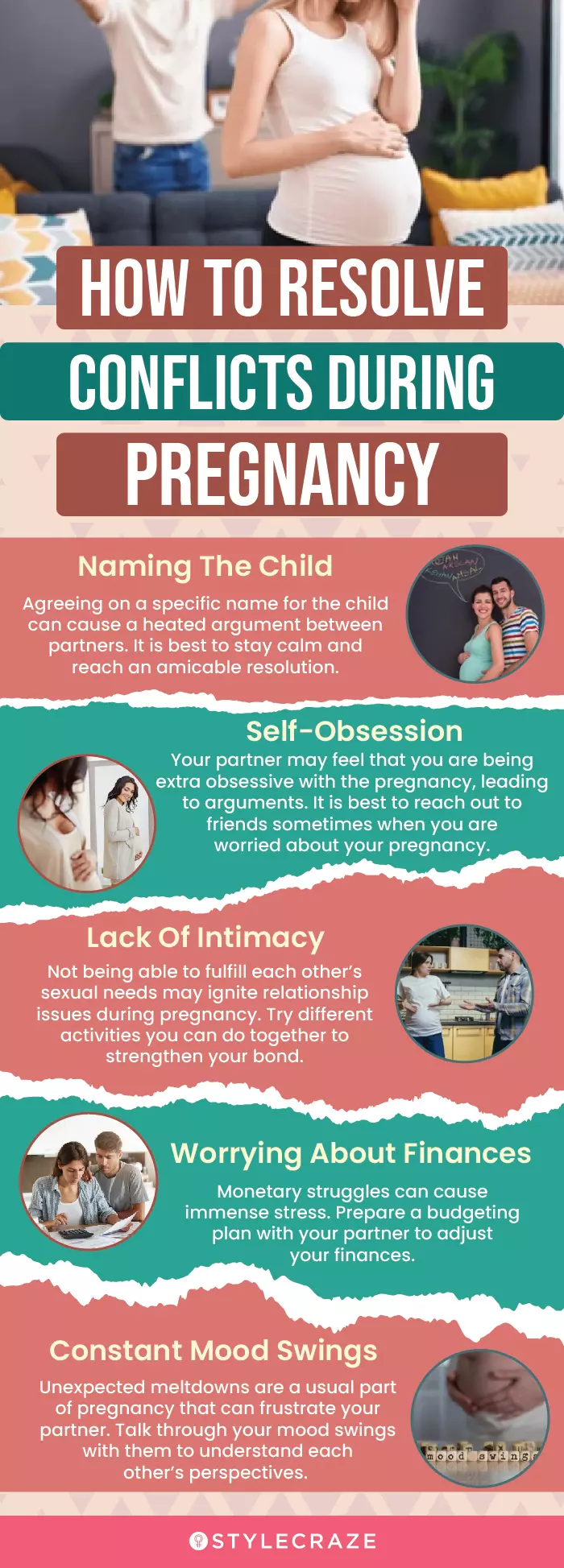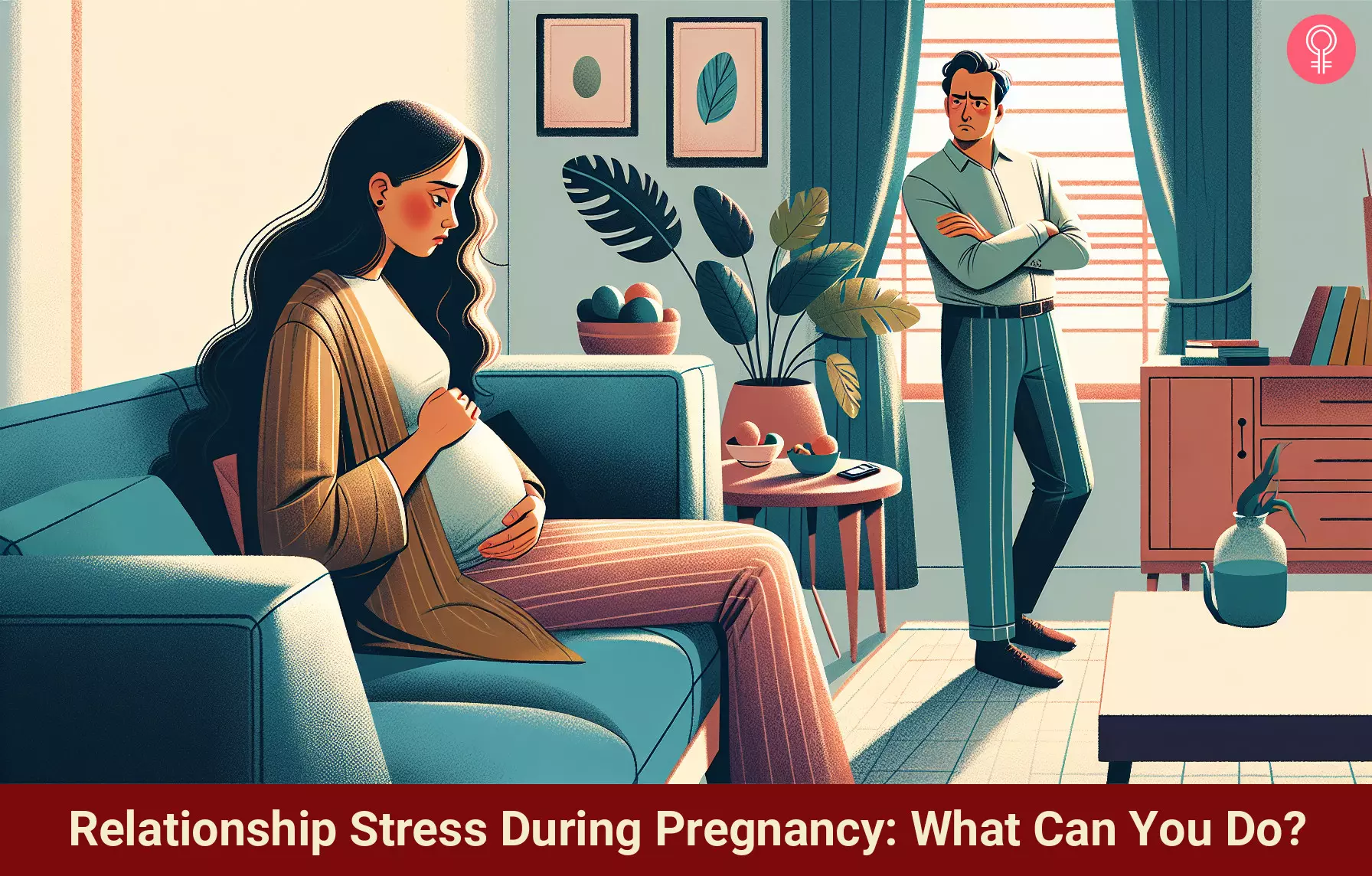Relationship Stress During Pregnancy: What Can You Do?
Learn how to maintain your bond during this phase to enjoy lasting intimacy and understanding.

Image: ShutterStock
The possibility of relationship problems during pregnancy cannot be ruled out. Pregnancy can influence the dynamics with your better half, and the stress you undergo during this phase may even cause your relationship to fall apart. Seems horrible to imagine, right?
Women undergo many physical and physiological changes during their pregnancy. For example, they may suddenly put on weight and experience terrible morning sickness, due to hormonal changes. They may even feel insecure about their looks and end up stressing themselves even more.
In this article, we will explore the best ways you can make your pregnancy a beautiful journey and how you and your partner can overcome possible relationship challenges during this phase. Let us get started.
In This Article
Balancing love and pregnancy is no less challenging than walking a tightrope. It is the clinching factor that could lead to a relationship breakdown during pregnancy. Naturally, to address the issue, one needs to understand the root cause that builds up to the main problem. So here is a look at how pregnancy changes your relationship:
1. Pregnant Women Can Become Clingy
You may have heard about pregnant women experiencing paranoia or relationship insecurity during pregnancy. Unfortunately, it is not an old wives’ tale.
The primary culprit here is the hormonal changes responsible for evoking a gamut of emotions during pregnancy (1). These negative emotions could manifest in the form of anxiety, panic, and even feelings of abandonment. As a result, their mental health takes a hit, causing them to always be on alert and fearing the worst.
Even the most independent or self-sufficient women can succumb to such thoughts and end up thinking, behaving, or acting irrationally. As a result, she may nag her partner by constantly asking them if they will leave her or call them every hour to check on them if they are doing fine, and sometimes even act strangely suspicious.
2. Each Partner’s Experience May Differ
A woman becomes a “mom” the moment she realizes that she is pregnant. The partner, on the other hand, experiences parenthood only when they hold the child for the first time. As such, the excitement and involvement that a pregnant woman feels vary vastly from that of the partner’s, especially if it is an unplanned pregnancy in a new relationship.
As a result of these variables, the partner may appear somewhat alienated on this journey, which can be frustrating for a pregnant woman. For instance, you may be excited about designing the nursery, but your partner may prioritize something else. This difference in experiences could cause some amount of friction in the relationship.
3. Your Partner May Appear Distant
As mentioned above, your partner may have a completely different version of your pregnancy as they are not sharing your experience (even if they really wanted to). Hence, they may just feel like an accessory, which can contribute to relationship stress during pregnancy.
The sense of disconnect widens, considering that everything now revolves around you, your health, and your well-being. They have to cater to all your whims, desires, and emotional needs. And as much as one hates to admit it, it can be a bit exhausting, both physically and mentally. They may, therefore, crave some “me time”, feel a lack of emotional support and indulge in their favorite activities, which can make them appear distant.
4. Intimacy Will Take A Hit
Your sexual relationship during pregnancy, especially during the first trimester, can get tricky. Between all the farts and burps, you may also experience general exhaustion and nausea. Things that once turned you on may now feel gross and icky, leading to intimacy concerns.
In the months that follow, your baby bump may make full-fledged intercourse nearly impossible, leaving your partner disgruntled. The lack of sexual intimacy can lead to a stressful relationship during pregnancy.
 Quick Tip
Quick TipBesides the discomfort that comes with pregnancy, other reasons for physical intimacy to take a hit could be that she feels out of shape and undesirable, and the husband may be afraid that it can hurt their baby.
5. From Couple To Parents
The anticipation and excitement of becoming parents come with a whirlwind of emotions. The shared focus on impending parenthood may lead to neglect of each other’s needs. Navigating the transition from a couple to parents brings a unique set of challenges that can strain your relationship during pregnancy.
Sleepless nights and hormonal changes can amplify stress. Having an open conversation is important to keep your relationship stress-free. This involves establishing honest dialogue, expressing concerns, and actively supporting each other with various challenges.
Seeking professional guidance or attending parenting classes together can help strengthen your teamwork. You need to embrace the changes as a shared journey, understand the emotional shifts, and prioritize self-care to contribute to a healthier relationship during this phase.
However, for all it is worth, you may discover a newfound emotional connection with your partner as you share this journey and its experiences with each other. This feeling could be a new way to find marital satisfaction minus the sex.
Now, let’s check some common issues that may pop up during pregnancy and how to resolve them.
Now that you know how pregnancy affects relationships, let us go into the details of typical relationship issues during pregnancy and how you can nip them in the bud.
1. Naming The Child
“I want to name my child after my grandmother, Ruth.”
“Ruth? What is it, the 1960s?”
Does such an exchange (or some variation of it) sound familiar? Well, you are not alone.
Finding a name that you can unanimously agree on can be tough. After all, a name is the first present that you give your child, and you would naturally want to make it as meaningful as possible. But parental disagreements and decision-making challenges are a normal part of any family dynamics, and they should be carefully and maturely handled .
If you are in the middle of the name-game, and it is causing difficulties to the point where you think of ending the relationship during pregnancy itself, try this:
- If you are already in the middle of a heated debate, take some time off to decompress.
- Once both of you are calmer, discuss the issue to understand the reasoning behind why you do not want a certain name.
- Set some ground rules and discuss what is negotiable and non-negotiable.
- List out the names that you like and ask your partner to do the same. Shortlist the names you both like. Continue weeding out the names until you have zeroed in on one!
Such an approach will also limit any resentment that may breed within your relationship after pregnancy.
2. Pregnancy And “Selfishness”
Remember when we talked about you and your partner having different experiences during pregnancy? Such emotions will result in pregnancy strain on the relationship.
Your partner may remark on your obsession with the pregnancy, or you may accuse them of being selfish, and things will spiral out of control. Both of you may then contemplate ending the relationship altogether. However, it does not have to be that way.
The best thing you both can do at this point is to rely on your friends to vent out any frustrations. It gives both of you the opportunity to let off some steam without causing more relationship stress during pregnancy.
 Quick Tip
Quick TipIt is important to maintain a calm atmosphere to reduce stress and maintain the health of the pregnant mama and baby. Therefore, it is essential to use a soft tone and careful wording and avoid screaming matches even when you both are frustrated.
3. Lack Of Sex
A woman’s body goes through a dramatic physical change when she is pregnant. This may affect both of your sex drives. Not meeting each other’s sexual needs is one of the most significant relationship issues during pregnancy.
Dealing with this sensitive topic can be tricky, and one wrong sentence can make things worse. You could also offend your partner or make them feel unwanted. Fortunately, there is absolutely nothing some clear communication cannot resolve. Talk to your partner and dispel any misconceptions they may have conjured up. (Like: “You do not find me attractive anymore!”)
At the same time, focus on the activities that you can do to maintain a physical relationship during pregnancy and “hand it out” generously every once in a while. Brooding over something that one wants to do and cannot do will make both of you unhappy and affect your marital satisfaction.
4. Worrying About Finances
Pregnancy and relationship stress can go hand in hand if you are already struggling financially. The problem gets aggravated when it is an unexpected or late pregnancy, leaving you stressed about the imminent expenses. Teenage pregnancy and relationships are often likely to be more vulnerable to financial strain and struggles.
While there is nothing that you can do about the expenses that will pile up during and after pregnancy and beyond, you can handle it better by creating a budget. Sit down with your partner and prepare a detailed budget to manage your money efficiently. Prioritize your expenses (a good school carries more weight than a fancy stroller!) and stick to the budget as much as possible.
5. Unexpected Meltdowns
Pregnancy is a hormonal roller coaster of emotions. On some days, you are battling depression during pregnancy, and on others, you are over the moon about starting a family. As a result of such mixed emotions, you may find yourself reacting rather than responding to your partner, which may cause a few hurt feelings. Some of the things that you say or do may even come as a shock to yourself, let alone your partner. And no matter how small, such outbursts could leave a lasting impression on your relationship.
Talk with your partner beforehand. As mentioned earlier, you can overcome the gravest relationship breakdowns during pregnancy through the magic of communication. Communication issues can be easily fixed by incorporating a little humor to even out tense emotions and being open to listening to your partner after you have caused them pain.
A good trick could be to assign yourself a funny nickname to signal that a storm is incoming. As a result, when Hormonal Holly is raging around, your partner can depersonalize and give you space.
In the next section, we discuss the importance of a healthy relationship and marital satisfaction during pregnancy. Check it out.
Why Is Maintaining A Healthy Relationship Vital During Pregnancy?
As you may have seen in the previous section, you and your partner will have to put in a lot of work to create a healthy, loving, and supportive environment while starting a family. But, is it really necessary? Let us examine the importance of mitigating relationship stress during pregnancy by nurturing a healthy relationship:
- A healthy relationship can leave the partners feeling loved and supported, which will equip them to deal with all sorts of unprecedented events.
- It can dispel any negative emotions that you may have, such as ending the relationship during pregnancy.
- As child-rearing can also get as stressful as pregnancy, it will help you transition smoothly from a couple to parents.
- A poor relationship can cause undue stress to the pregnant woman, which may impede the healthy development of the baby and even cause other complications such as premature labor and miscarriage (2), (3).
You now know the link between a relationship and pregnancy, how one affects the other, and the other way round. But, do planned or unplanned pregnancies elicit different responses? Could they play a role in determining the relationship stress during pregnancy? We will review it in the next section.
Does Planned Pregnancy Mean Lesser Relationship Stress During Pregnancy?
A planned pregnancy is less likely to cause relationship issues. In this case, both partners have talked at length to reach the decision that they want to raise a child together. The mutual feeling of shared responsibilities motivates the partners to create and nurture a confident environment during and after pregnancy.
Furthermore, when you plan to get pregnant, you start by developing healthy habits and an equally healthy lifestyle. You will also be invested in prenatal care. As a result, the newborn will also be healthy right from birth, which can help mitigate any other probable relationship stress in the future.
On the other hand, an unplanned pregnancy can wreak havoc and cause mental health issues and psychological distress, especially in pregnant women. Research indicates that unplanned pregnancy can increase the risk of psychological distress during pregnancy, leading up to even nine until nine months postpartum (4).
Naturally, such emotions will also seep into your partner, causing them to also be unhappy. As stated previously, teenagers and low-income households are more susceptible to long-term strain caused by pregnancy, which will affect the quality of their relationships.
Infographic: How To Resolve Conflicts During Pregnancy
Pregnancy is a beautiful phase and yet a hormonal roller coaster of feelings. There are instances where certain mood swings might affect the bond between spouses negatively. In such cases, it is crucial to know how to deal with it to keep your relationship sailing happily. Below is an infographic that lists some common pregnancy-related issues and ways to resolve them. Read through to know better!

Illustration: StyleCraze Design Team
Pregnancy is a period of turmoil and can bring changes to your relationship along with other aspects of your life. And these changes can be both positive and negative. However, if you and your partner understand each other well, you do not have to worry if the changes are not to your liking. Relationship problems during pregnancy are common, so do not panic if you come across them.
Support each other during this significant phase of your lives and commit to making the pregnancy a beautiful and memorable experience. Your little one is on the way, so you need to create a positive aura around the house as parents.
Frequently Asked Questions
Is it normal for couples to break up during pregnancy?
While it is not normal for a break up to happen during pregnancy, a few couples may end their relationship during this period. This could be attributed to the major change in their lives. Hence, communicating and resolving the issues can help maintain the relationship during this phase.
What should husbands not do during pregnancy?
Commenting on their wives’ physical appearance, pouring in advice, relating every point the partner says to mood swings, and making fun of her food cravings are a few things husbands should not do during the pregnancy phase.
Is it normal for my wife to hate me during pregnancy?
Although it is not exactly the hate from your wife, you may notice a few drastic changes in her behavior that may make you wonder whether she likes you anymore. But these behavioral changes are normal during pregnancy and are triggered by hormonal changes. Hence, understanding your partner and maintaining transparent communication can resolve any relationship conflict during pregnancy.
What are some ways to minimize relationship stress after pregnancy?
Be patient with each other and listen to each other’s concerns. You can also go for couples therapy to learn more about stress management and postpartum depression.
Key Takeaways
- Hormonal changes during pregnancy can evoke anxiety and feelings of abandonment, which can contribute to relationship stress.
- The partner may feel alienated and seem distant because they don’t feel as involved or important in the pregnancy.
- Conflict over what to name the child and lack of intimacy may also contribute to pregnancy stress.
- It is important to work on and reduce pregnancy stress for the health of your baby.

Image: Dall·E/StyleCraze Design Team
Nurture your relationship with your partner during pregnancy. Learn tips on how to stay connected and keep the romance alive in the video below. Play now!
References
Articles on StyleCraze are backed by verified information from peer-reviewed and academic research papers, reputed organizations, research institutions, and medical associations to ensure accuracy and relevance. Read our editorial policy to learn more.
- An Update on Mood and Anxiety Disorders During Pregnancy and the Postpartum Period
https://www.ncbi.nlm.nih.gov/pmc/articles/PMC181144/ - Effect of maternal stress during pregnancy on the risk for preterm birth
https://bmcpregnancychildbirth.biomedcentral.com/articles/10.1186/s12884-015-0775-x - The association between psychological stress and miscarriage: A systematic review and meta-analysis
https://idp.nature.com/authorize?response_type=cookie&client_id=grover&redirect_uri=https%3A%2F%2Fwww.nature.com%2Farticles%2Fs41598-017-01792-3 - Unplanned pregnancy and subsequent psychological distress in partnered women: a cross-sectional study of the role of relationship quality and wider social support
https://www.ncbi.nlm.nih.gov/pmc/articles/PMC5267424/
Read full bio of Dr Nancy B Irwin
Read full bio of Shatabdi Bhattacharya
Read full bio of Gracia Odile






























